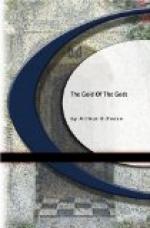“Very well, then,” she replied reluctantly, not to seem to change what had been her past refusal too suddenly. “I may ask Professor Kennedy, too?”
He could scarcely refuse before us. “Of course,” he agreed, quickly turning to us. “We were speaking about meeting this afternoon at four in the tea room of the Prince Edward. You can come?”
Though the invitation was not over-gracious, Kennedy replied, “We should be delighted to accompany Miss Inez, I am sure. We happened to be passing this way and thought we would stop in to see if anything new had happened. Just as we turned the corner we saw you disappearing down the street, and followed. I trust everything is all right?”
“Nothing more has happened since this morning,” she returned, with a look that indicated she understood that Kennedy referred to the anonymous letter. “I had a little shopping to do. If you will excuse me, I think I will take a car. This afternoon—at four.”
She nodded brightly as we assisted her into a taxicab and left us three standing there on the curb. For a moment it was rather awkward. To Alfonso her leaving was somewhat as though the sun had passed under a cloud.
“Are you going up toward the University?” inquired Kennedy.
“Yes,” responded the young man reluctantly.
“Then suppose we walk. It would take only a few more minutes,” suggested Kennedy.
Alfonso could not very well refuse, but started off at a brisk pace.
“I suppose these troubles interfere seriously with your work,” pursued Craig, as we fell into his stride.
“Yes,” he admitted, “although much of my work just now is only polishing off what I have already learned—getting your American point of view and methods. You see, I have had an idea that the canal will bring both countries into much closer relations than before. And if you will not learn of us, we must learn of you.”
“It is too bad we Americans don’t take more interest in the countries south of us,” admitted Craig. “I think you have the right idea, though. Such men as Mr. Whitney are doing their best to bring the two nations closer together.”
I watched the effect of the mention of Whitney’s name. It seemed distasteful, only in a lesser degree than Lockwood’s.
“We do not need to be exploited,” he ventured. “My belief is that we should not attract capital in order to take things out of the country. If we might keep our own earnings and transform them into capital, it would be better. That is why I am doing what I am at the University.”
I could not believe that it explained the whole reason for his presence in New York. Without a doubt the girl who had just left us weighed largely in his mind, as well as his and his mother’s ambitions, both personal and for Peru.
“Quite reasonable,” accepted Kennedy. “Peru for the Peruvians. Yet there seems to be such untold wealth in the country that taking out even quite large sums would not begin to exhaust the natural resources.”




